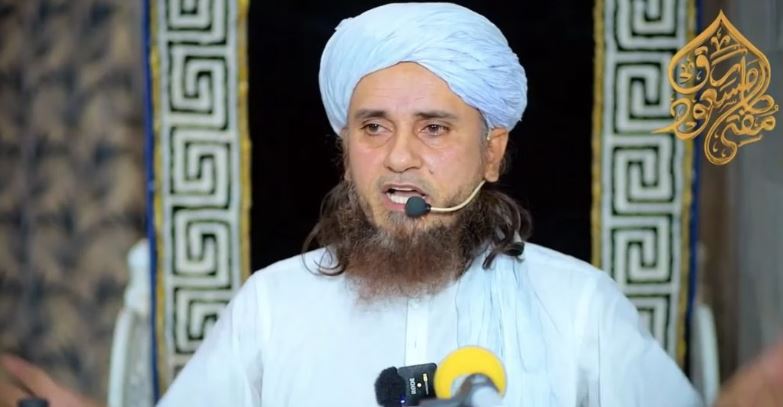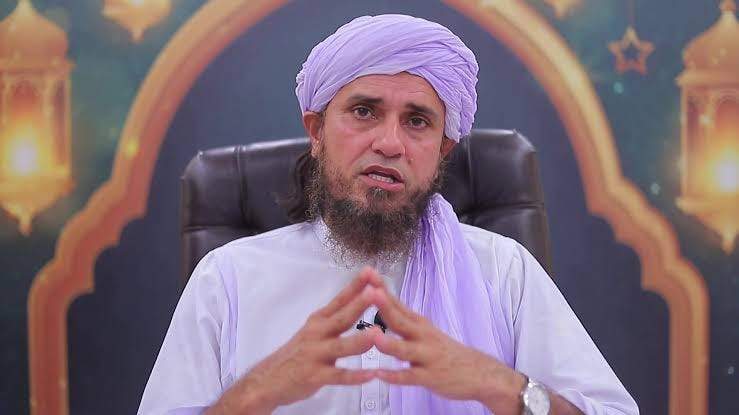This incident has not only reignited debates
surrounding religious extremism but also
highlighted the challenges to moderate voices
by Sahir Baloch

Renowned Islamic scholar Mufti Tariq Masood has recently found himself at the center of controversy following claims of alleged “grammatical errors in the Holy Quran.” This incident has reignited discussions about religious extremism in Pakistan and the challenges faced by moderate voices in a polarized society.
The Controversial Remarks
A video of Mufti Tariq Masood speaking at Surrey Jamea Majid in Canada went viral, leading to widespread criticism from the Muslim community. In his address, he discussed the concept of the Prophet Muhammad (PBUH) being ‘Ummi’ (unlettered).
He claimed that, due to the Prophet’s inability to read and write, some grammatical mistakes made by the Sahabah (companions) while transcribing Quranic verses still exist in the Holy Book. He even suggested that certain words in the Quran are grammatically incorrect.
This assertion sparked immediate backlash, with many accusing him of blasphemy. The uproar escalated, prompting calls for accountability from various religious factions.
Mufti Tariq Masood’s Apology
In response to the backlash, Mufti Tariq Masood issued a public apology, stating that his words were misunderstood. He emphasized that he never intended to challenge the divine nature of the Quran or its authenticity.
In a follow-up video titled “Mufti Sahab Ki Sareeh Lafzon Mein Mazrat,” he reiterated his respect for the Holy Quran and expressed regret for any offense his comments caused. He clarified that his discussion aimed to address human errors that occurred during transcription, not to undermine the Quran itself.

Manzoor Mengal’s Reaction
Amidst this controversy, religious figure Manzoor Mengal gained attention for his viral videos discussing Mufti Tariq Masood’s remarks. Mengal rejected Masood’s first apology, demanding an unconditional apology instead.
He warned that if Masood did not tender an unconditional apology, he would face harsh consequences, stating, “I fear someone will kill Mufti Masood if he does not apologize unconditionally.” While Mengal’s rhetoric aligns with extremist views, his reactions exemplify the heightened tensions surrounding religious discourse in Pakistan, where calls for severe consequences are often fueled by radical ideologies.
The Rise of Religious Fanaticism
This incident highlights a broader trend of rising religious fanaticism in Pakistan. Over recent years, extremist groups have gained traction, often resorting to violence to silence dissenting voices.
The reaction to Mufti Tariq Masood’s comments exemplifies how moderate interpretations of Islam are overshadowed by hardline ideologies. Many scholars and activists argue that the climate of fear created by extremists stifles healthy discourse and encourages self-censorship among those who wish to express differing opinions.
Public Response and Social Media Dynamics
The apology and its aftermath sparked a heated debate on social media. Supporters of Mufti Tariq Masood defended him, asserting that his comments were taken out of context. Critics, however, contended that his remarks were reckless and contributed to existing sectarian divides.
Several scholars and religious figures expressed their disapproval, demanding action against Masood. A Shia youth organization, Nojawanan Millat-e-Tashiou Gilgit, even lodged a police application against him for his comments.
TLP cleric Hassan Raza Naqshbandi urged the government to register a blasphemy case against Mufti Tariq Masood under Sections 295C and 295B, alleging that he insulted Allah, the Prophet (PBUH), and the Quran.
The Role of Government and Law Enforcement
The government of Pakistan faces criticism for its inadequate response to the rising tide of religious extremism. Activists urge authorities to take decisive action against hate speech and promote a narrative of tolerance and pluralism.
However, the struggle to balance appeasing religious groups and protecting free speech complicates the situation.

Conclusion
Mufti Tariq Masood’s apology is a significant moment in Pakistan’s ongoing struggle with religious fanaticism. While his attempt to mend fences highlights the challenges faced by moderate voices, it also underscores the urgent need for collective efforts to foster a more tolerant society.
In a country where the line between faith and fanaticism often blurs, dialogue and understanding are essential to bridging divides and promoting harmony.
Looking Forward
As Pakistan continues to grapple with issues of extremism, the resilience of moderate voices like Mufti Tariq Masood will be tested. The path forward requires not only introspection within religious communities but also a commitment from society to uphold peace and tolerance.
Only then can the country hope to emerge from the shadows of fanaticism and foster an environment where diverse interpretations of faith can coexist.























